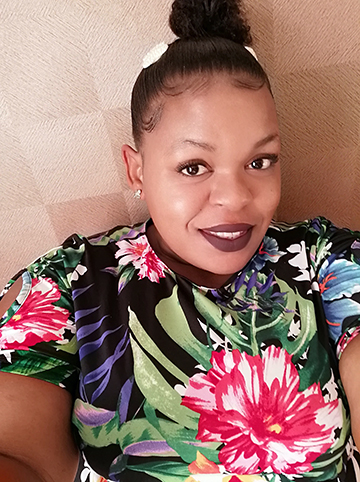News & Events
Breaking barriers through education
Determined Unisa postgraduate student, Thuthula Sodumo, believes that education can assist with advocating for the rights of persons with disabilities and change the status quo of what it means to have a disability in South Africa. Sodumo is paraplegic and uses a wheelchair for mobility, which motivates her even more to embrace the value of education. “My former and late principal, Mongezi Mjila, instilled a value in students that the only way to make it in life as a disabled person is through education,” she remarks.

Thuthula Sodumo
Sodumo has acquired two undergraduate degrees at Unisa and is pursuing a Bachelor of Arts Honours in Gender Studies under the institution’s College of Human Sciences. She says: “I chose this qualification to understand the dynamics between able-bodied and disabled women in terms of life experiences. Additionally, I would like to address the gender-based violence crisis in South Africa and determine what could help different genders to live together in harmony.”
She is the secretary of the Unisa Eastern Cape Student Disability Forum, which works closely with the university’s Advocacy and Resource Centre for Students with Disabilities (ARCSWiD) to better the lives and academic journeys of disabled students. She explains: “We assist with registrations and any academic-related matters. We also provide disability advocacy on campus and observe days dedicated to disability.”
Inclusivity of students with disabilities
Sodumo calls on an enhanced recognition of students with disabilities structures at institutions of higher learning. She says that the COVID-19 pandemic also affected their visibility and encourages the university’s various structures to support them better.
She addresses some of the challenges faced by students with disabilities: “There is a gap between disabled and able-bodied students, and people struggle to relate to our challenges. Most students with disabilities survive on disability grants; as a result, some drop out of universities due to lack of funding.” She adds: “We need more academic support around receiving the necessary and assistive study materials in correct formats, with assignments, getting extra time during examinations, and receiving data beyond examination periods.”
Sodumo refers to ARCSWiD as ‘faithful servants of the people’ and acknowledges that it has been inclusive and supportive. When she experiences challenges with her postgraduate studies, the centre assists by communicating with her lecturers. Sodumo is grateful that ARCSWiD provided funding assistance for one of her undergraduate qualifications.
ARCSWiD’s Pintias Nkuna says: “We are situated within the Learner Support and Student Affairs portfolio, which is one of the three directorates under the Dean of Students. Our two focus areas are student support and administration, as well as advocacy and training.” He continues: “For students with disabilities, we provide services around electronic versions of prescribed books obtained on request from publishers, interventions with academic departments, and orientation and mobility assistance for visually impaired students.”
Acknowledging that it is not always easy for students to disclose and accept their disabilities, the centre provides motivational talks. In addition, it refers these students to the Association for Persons with Disabilities, which specialises in various disabilities−which re-affirms Unisa’s commitment to shaping futures.
Sodumo concludes: “The society judges and perceives us as burdens that must be locked up and hidden. Through education, you can break such barriers and demystify the stereotypes. Never limit yourself.”
*By Nancy Legodi, Acting Journalist, Department of Institutional Advancement
Publish date: 2022-07-22 00:00:00.0

